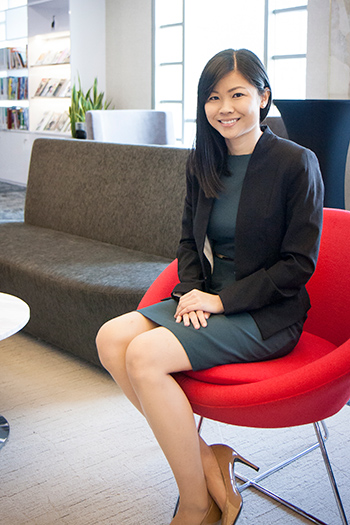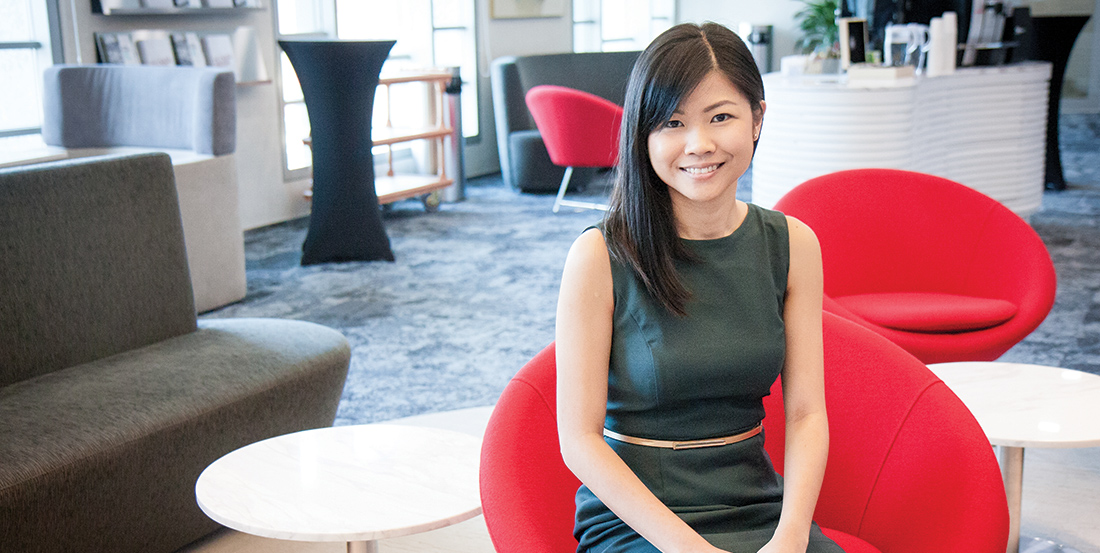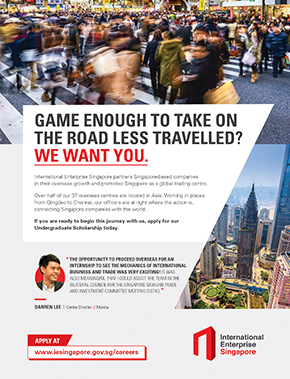S ingapore’s strategic location, political stability and pro-business environment make it one of the easiest places to trade and do business. On top of this, Singapore is Asia’s leading commodity trading hub and has a network of industry players along the value chain. For these reasons and more, commodity players from around the world have chosen to entrench their trading operations in Singapore, effectively boosting the growth of our thriving trade hub and strengthening our overall economy.
“People are very much aware of IE Singapore’s work in helping Singapore companies expand overseas. What is often overlooked is IE’s work in growing Singapore as a trading hub. Our heritage stems from our beginnings as the Trade Development Board in 1983,” explains Chow Guan Min, who has been with IE Singapore’s Trade Group for over five years.
Guan Min is currently a Senior Manager in the Trade Group’s Trade Finance and Insurance Unit. Her key role is to ensure that the trading community in Singapore is able to effectively access financing and insurance through service providers based here. “We do this by facilitating connections between traders, financiers, and insurance brokers and underwriters. We also try to understand gaps in the local trade financing and insurance landscape, and work towards plugging these gaps by bringing critical industry players to Singapore. Another important aspect of our work is to put forth policy recommendations that would better enable trading companies’ access to trade financing and insurance here,” Guan Min encapsulates her role perfectly.
Opportunities in Trade
Guan Min tells us honestly that she never expected to join the Trade Group. Back when she was an undergraduate at the University of Chicago, she looked forward to a career in supporting local companies as they make their mark on the global map. It was not until she got a taste of trade work during her internship in Guangzhou, China that she reevaluated her goals. This two-month internship was when she worked with her regional director to uncover and encourage trading companies based in the Guangdong province and in Hong Kong to set up their regional trading operations in Singapore. Her internship experience was one of the motivations behind her decision to join the energy and chemicals division within the Trade Group after graduating from UChicago and thereafter Stanford.

Chow Guan Min
IE Singapore Overseas Undergraduate Scholar
Senior Manager, Trade Finance and Insurance Unit, Trade Group
Her time in the Trade Group has brought her a string of opportunities that form the tapestry of a rich and stimulating career. Guan Min shares one distinct highlight of her time at IE Singapore, when she was part of the organising team of the Trade Group’s biennial flagship event, the Global Trader Summit (GTS). As this event was in conjunction with IE Singapore’s 30th anniversary, her team was challenged to bring the event to a whole new level.
She recalls, “We experimented with new concepts and discussion formats to break away from having just conventional panel discussions. For example, for one of the sessions, we invited a futurist to paint a picture of what the trading landscape would be like in 2030. Our delegates were then split up into three groups representing different jurisdictions. They were encouraged to come up with strategies that will enable their jurisdiction to become Asia’s leading trade hub by 2030.”
Of the experience, Guan Min tells us, “Moving away from the standard format was definitely risky. We also invested in a lot more resources to pull the programme together. I am pleased to say that the project was a success, and it cemented the bonds among all of us in the organising team.”
Receiving and Giving Empowerment
Guan Min shares that one rewarding aspect of work is the opportunity to meaningfully engage senior representatives of MNCs as a young officer. “Not many places offer fresh graduates such access. I also appreciate various opportunities to be involved in strategy development for the sector, as well as impactful industry projects at an early stage in my career,” she muses.
These industry projects she speaks of include one she is currently spearheading, which requires her team to analyse the macro attributes of the wholesale trade sector. “Apart from studying the sector’s industry structure, trade flow and composition, we are also tasked to develop a good grasp of the businesses across the sector’s various segments. It can be challenging to learn about an industry when you’re not in it and especially when time is a constraint,” Guan Min highlights.
This is why she strongly emphasises the importance of learning quickly. She tells us, “Apart from understanding industry concepts, you need to be able to explain them to our stakeholders in a concise and layman manner. You also have to learn how to effectively engage stakeholders from various markets, various industries, and businesses of various sizes. This requires one to be flexible and adaptable.”
But the biggest advice she wants to impart to students is that a scholarship is the first step towards one’s career. She ends off gracefully, “It is important to understand what your career interests are, and how well these align with the career that your scholarship provider can offer.
“It will also be helpful to talk to current scholars or officers, especially those who have been in the orgnisation for some time. Listen to their work experience to have a better understanding of what the job entails, and what to expect realistically.”

